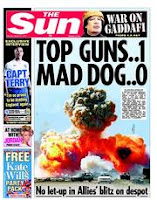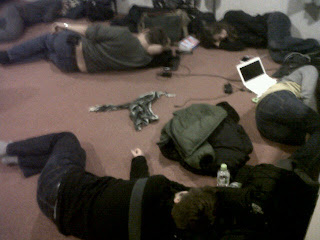The first time that I became aware of Helen Moss was at the Midstaffs foundation trust AGM in 2009.
To call this a lively meeting would be an understatement. The pressure group were out in force and well organised. It was the first time that many ordinary members of the trust were exposed to the level of anger the pressure group is capable of producing. In the AGM Helen Moss was called to answer a question on “hand overs”. The group all stood up with placards, and shouted “we want you to go”. The ordinary members in the room were visibly shocked.
Over the following weeks there were frequent photographs in the local press of the protest group holding placards demanding the resignation of Helen Moss. The reasons for their demand were never explored.
Eventually the protest group got their way. She gave up the job and moved away.
Earlier this year there was an interview in the local press with the head of the protest group which set this in context. I have no way of knowing how accurate this account may be. The report indicates that It came back to a phone call from her to Helen. It was clear that there was no meeting of minds. The head of the protest group describes “a switch” going off in her head, and she made up her mind to get Helen out of her job.
There have been demands from the protest group for the sacking of all the staff, and for closing the hospital ward by ward and clearing out any staff that were not up to their jobs, but in the case of Helen it was personal.
28th March 2011 was the first day in which I had an opportunity to hear Helen’s story. Full transcript here She is a quietly spoken, intelligent woman, trying hard to answer difficult, and at time hostile questions with precision.
It is clear that she took up her job as director of nursing at a very difficult time. The staff numbers had been allowed to run down as part of the cost saving exercise to get the hospital back into line financially. The pressure of working constantly with not enough staff was beginning to tell and staff morale was low.
Helen gave the best description I have yet heard of the peculiar culture that is said to have existed at the hospital. There was nothing at Stafford to attract ambitious young nurses, Stafford did not look like a hospital that offered a career path. Many of the nurses that came did so directly from the university, and therefore did not gather experience in the wider world of the NHS. It was, as we had heard from other witnesses an enclosed world, with not enough challenges from outside. There were things that were being done to ensure greater quality in many hospitals which did not seem to have taken off in Stafford. (All of these issues have been actively addressed now).
Helen was faced with a big problem. She needed to do what she could to change the culture of the hospital, and she also had the task of trying to recruit more nursing staff to get things up to “establishment”. She did not have as much money as she felt she would need for this task. This is a task that was as time went by becoming increasingly difficult. Nurses were reluctant to come into a hospital which was understaffed The effects of the under staffing led to the complaints from the pressure group. As the pressure group’s campaign gathered force there were the growing pressures of media attention.
It became impossible to recruit the full time staff the hospital needed at the speed that it needed to do it. This was like running a bath with the plug out. Recruitment was going on constantly, but staff turnover was accelerating.
This article which takes us back to October 2008 before the issues of the health care commission report gives us a snap shot of the growing pressures.
The Health Care Commission investigation was experienced by the staff who were trying to make the hospital work as an additional burden. Helen, like many of the staff who have spoken before, talks about how difficult and hostile this investigation process was. It was clear that the HCC was not there to help the hospital.
The inquiry focused in on Helen’s understanding of the mortality figures. This is now a standard part of the questioning to virtually all witnesses. Helen’s evidence here is important because she was there and in charge of clinical governance at the time that the figures were an issue. Her testimony is in line with that we have heard from all those people who were part of the hospital and had reason to understand the mortality figures.
The Dr Foster figures first became an issue in 2007. This was the time at which the Dr Foster system was shifting from being a management tool that some hospitals had brought into, to being a tool that foundation trusts, or hospitals seeking to become foundation trusts, were required to use in order to show their “performance”. It was clearly know in the hospital from before the issue of the figures, that their coding of cases was not being done properly.
They had expected to come in with a coding figure of 114 which was moderately high, but a last minute change in the methodology by which the Dr Foster company generated the figures led to a significantly higher figure of 127. This put the hospital in the “worst” 5 in the country.
The hospital were alarmed by this and immediately sought advice. The Dr Foster company provided re-assurance. It was clear to them too that the coding was “shallow” and that this would have led to an elevated HSMR figure. They thought that the high figures could be adequately explained by this.
The Hospital did not leave it at that they took a series of steps. They recruited a new coding manager. This was necessary, because funding was now partially dependant on HSMR level. The coding manager worked with a newly formed mortality group, which reviewed deaths over the previous year. This we have heard from Eric Morton was cross referenced by the PCT with GPs case notes, and it verified that the coding had been done wrongly in many cases, and that a misleading figure was therefore produced.
The Mortality group began the task of focusing in on the fine detail of mortality figures to see if there were any patterns. Or any indication of underlying problems.
The Mortality group began the task of focusing in on the fine detail of mortality figures to see if there were any patterns. Or any indication of underlying problems.
As the coding manager began to take on new cases, the mortality rates being produced by this new “robust” data dropped steadily from high, to average, to well below the national average.
The hospital sought advice from the SHA and Birmingham university. Research was carried out into the Dr Foster Methodology. (This has led in 2010 to changes in the way in which mortality is measured on a national basis.) The Birmingham research did also spell out that the Hosptial should not rely exclusively on the coding, and should explore ant other areas of weakness which might account for the high figures. This feeds back to the work that the mortality group was undertaking.
The hospital took on board the advice from the university that the HSMR figures in themselves could not provide a reliable picture of the quality of service and advised on looking at other ways of measuring the quality of work including performance dashboards, which look at a wide range of indicators.
Through all this careful painstaking work there were problem areas being identified, and the hospital sought expert advice from the college of surgeons to produce a report on one specific area where concerns had been raised.
The Healthcare commission for reasons which have yet to be explored chose not to accept the line which was accepted by the Hospital, the PCT, the SHA, Birmingham university, and even we hear from the Dr Foster company, that “it was the coding” and they came in to carry out their investigation.
The HCC did not share information with the hospital during this process, and because of that the hospital called in Price Waterhouse Cooper to give them advice on what they needed to do to improve matters.
Helen was asked about her reaction to the horror stories that are now so familiar to everyone through the press about poor care in the hospital. She like virtually all the people who have been asked this question expressed the shock she had felt. She also showed that there was nothing in her own experience of the hospital that prepared her for these stories.
She did carry out regular visits to wards all over the hospital as a key part of her job. She had staff expressing to her their frustration about staffing levels and staffing mix. She was actively working to satisfy this through the recruitment process, and through a staff mix review, that was put in place to help push for the extra funding that was needed to bring staffing up to the right levels. She did not in her frequent visits to the wards see anything in line with the stories told in the press, and she did not have nursing staff coming to her and saying that the staffing levels had reached the point where it was impossible for them to do their job.
The impression that I was left with at the end of this evidence was of a genuine caring and hardworking person, who had tried to do a difficult job under difficult circumstances, and was in the end defeated by a unique set of circumstances. This article shows the kind of pressure that she was under.
I would have liked the inquiry to invite her to say what she had felt about being on the receiving end of such pressure. I am sorry that they did not ask her this.
Helen gave the apology to the bereaved which is now a standard part of most people's evidence.
Here is the coverage of the day from BBC and Express and Star.














